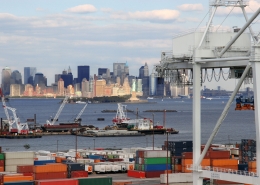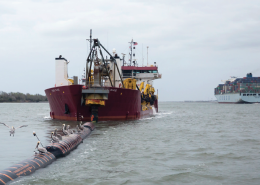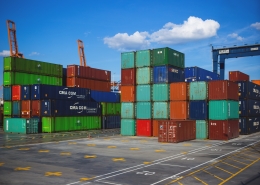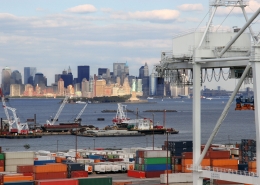On Monday, January 8, Dr. Susan Handy delivered the Thomas B. Deen Distinguished Lecture at the Transportation Research Board’s Annual Meeting. The Deen Lectureship invites honorees to provide overviews of their technical area of expertise, including the evolution, current status, and future prospects of their work and their field. Dr. Handy is a Professor in the Department of Environmental Science and Policy at the University of California at Davis and the Director of the National Center for Sustainable Transportation. Her career has spanned more than 30 years, and she has made major contributions to academic research on travel behavior and the built environment as well as bicycling as a mode of transportation.
Dr. Handy’s Deen Lecture, entitled “Shifting Gears: Reflections on the Role of Researchers in Shaping the Ideas that Shape Transportation” (a prerecorded version is available here and a published version will be available in a forthcoming volume of Transportation Research Record), provided an opportunity to expound on the contents of her recently published book, Shifting Gears: Toward a New Way of Thinking About Transportation. The lecture and book serve as an invitation for transportation professionals (be they researchers, practitioners, or both) to recognize and reflect on the power they wield as knowledge brokers trading in the currency of ideas.
Both in her lecture and in her book, Dr. Handy problematizes nine traditional ideas at the core of professional thinking, which she argues serve in concert to make it easier to drive. She contrasts these traditional ideas with a new or emerging set of ideas that promise to make it easier and safer to not drive.
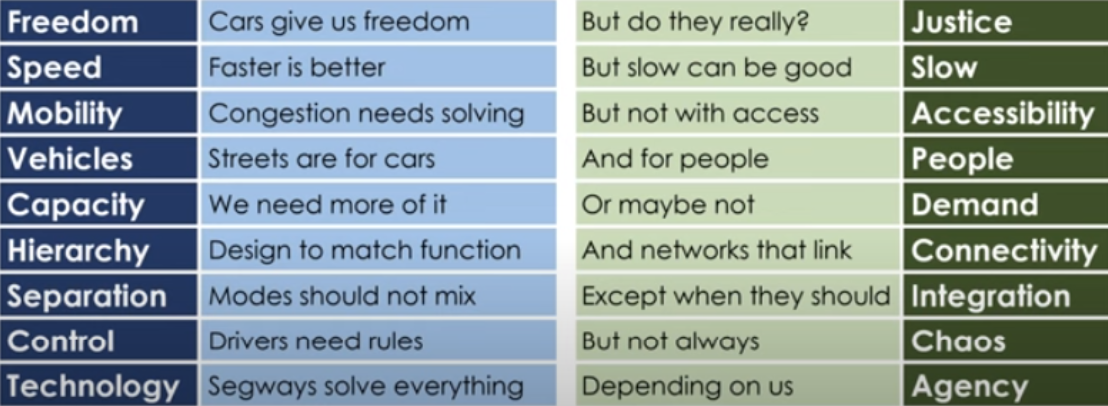
(Image Source: Slide from Dr. Handy’s Deen Lecture, available online).
Yet the shift in professional thinking about transportation across these ideas has not been smooth, certain, or complete. In some cases, a broadening of thinking has taken the place of any shifting toward new ideas and away from traditional ones, and that has allowed some ideas to endure rather than (meaningfully) cede ground – the enduring focus on mobility-based measures and policies being a prime example, even as the transportation profession professes to adopt accessibility-based goals.
Dr. Handy’s core thesis is that ideas function as the working premises upon which professional thinking is based; professional thinking in turn shapes the practices, tools, and guidelines developed by transportation professionals, along with the resulting policies, decisions, and systems.
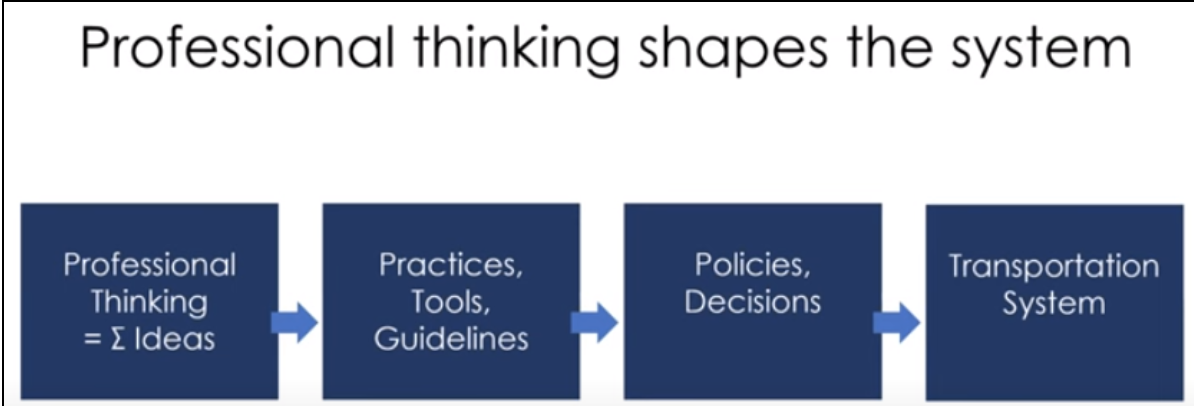 (Image Source: Slide from Dr. Handy’s Deen Lecture, available online).
(Image Source: Slide from Dr. Handy’s Deen Lecture, available online).
As Dr. Handy posited as her core premise at the lecture, “research will have little impact on what the transportation profession does if it does not also change how the profession thinks” an echo of the great insight that we cannot solve problems using the same thinking that created them. This helps to explain, Dr. Handy argues, the long runway of congestion pricing policy implementation in the U.S. – despite research on its efficacy dating back to at least the 1950s. Why do new ideas struggle to gain traction? Why don’t they sway decision makers? Using her Deen Lectureship platform, Dr. Handy takes aim at these questions and challenges the TRB community to wrestle with and confront their roles as:
- Questioners who can choose to support or challenge the status quo
- Researchers and practitioners who can play various roles in the process of shaping the transportation system
- Educators who create and participate in pathways to shaping professional thinking
- And, finally, as advocates who need to think deeply and carefully about what it is our research is for or against.
Dr. Handy is an exemplary educator – at one point, the hall of attendees gave applause to dozens of her students in attendance – and she used her Deen Lectureship as an opportunity to demonstrate how teaching and learning are so often two sides of the same educational coin. While inviting attendees of the lecture to listen and learn, she also invited participation in a voluntary online survey to share about the “most notable changes over the time you’ve seen in the profession” and “notable things you see that have not changed” – and promised to review responses to further inform her own thinking on these ideas and professional thinking.
Coming up in February, the Eno Center for Transportation will be honored to host Dr. Handy for a webinar featuring her work on Shifting Gears. We invite you to read her book and review her Deen Lectureship in preparation for a stimulating discussion on the transportation profession, ideas and new ways of thinking, and the roles we play as researchers, practitioners, educators, and advocates in the stewardship and creation of our shared transportation systems.






